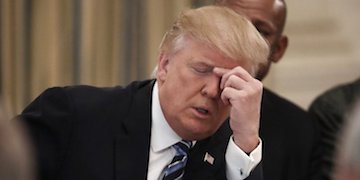Donald Trump’s dramatic decision to blow up infrastructure negotiations amid swirling talk of impeachment revealed a president willing to abandon the remainder of his first-term legislative agenda for a political brawl.
Trump stormed out of talks with Democrats on Wednesday, saying he wouldn’t negotiate with leaders who hours earlier accused him of a “cover-up” to evade probes into his personal conduct and finances. The drama—which Democrats painted as a premeditated stunt—exposed Washington’s deepening personal and partisan division.

In threatening to set aside work on issues of broad concern to American citizens—including crumbling highways and skyrocketing drug prices—the president allowed his critics to say he’s put his own political fortunes ahead of the nation’s business. The display unnerved even some of his closest congressional allies.
“I understand his frustration, but it’s not a sustainable position,” said Senator Lindsey Graham, a South Carolina Republican who has become one of Trump’s biggest backers on Capitol Hill. “The party that’s seen that they don’t want to govern at all is going to be in real trouble.”
Minutes-Long Meeting
For Trump, the infrastructure negotiations he abandoned offered a chance to demonstrate pragmatism and break from Republican anti-government orthodoxy.
Democrats, meanwhile, appeared eager to show they sought legislative accomplishments and not just unbending opposition to the president and his agenda. They hoped to exploit Trump’s affinity for big construction projects and one-on-one deal-making.
Democratic leaders were invited to the White House on Wednesday to discuss an infrastructure plan that they and the president have agreed may total $2 trillion. But the meeting ended abruptly after just a few minutes when Trump walked in, announced he wouldn’t meet with them because of the ongoing investigations and left.
Trump proceeded to the Rose Garden, where journalists had been assembled in front of a podium decorated with a sign titled, “Mueller Investigation By the Numbers.” The president recited a familiar litany of complaints about Special Counsel Robert Mueller’s probe and those launched by House Democrats. He said he told House Speaker Nancy Pelosi and Senate Minority Leader Chuck Schumer that he wanted to work on an infrastructure plan, “but you know what, you can’t do it under these circumstances.”
“What happened in the White House would make your jaw drop,” Schumer said afterward.
“I pray for the president of the United States,” Pelosi said.
Trump’s Walk-Outs
To some degree, it was classic Trump. He stormed out of a similar meeting with Democrats in January meant to resolve the government shutdown he precipitated after Congress refused to provide as much money as he demanded for a border wall. He walked out of a meeting with Kim Jong Un in February after the North Korean leader made demands the president and his advisers considered unreasonable.
Senator Susan Collins, a Maine Republican, predicted Trump would back down in the latest dispute.
“That’s not going to be a permanent decision by the president,” she said. “I think he will change his mind about it because I know he wants action on drug prices, for example.”
Schumer on Thursday told CNN that voters will have the ultimate say in whether the tactic works for Trump. “The presidency is not just a reality show and if you don’t get real things done for the American people they will want change again and they will want change from Donald Trump,” he said.
But the breakdown casts doubt on shared priorities between Trump and his opponents as well as critical negotiations to come.
It seems likely to impact negotiations to raise budget caps and avoid severe, automatic cuts to federal spending in December. That agreement is also intended to raise the U.S. debt limit. Treasury Secretary Steven Mnuchin said earlier Wednesday that the government may default on its debt by “late summer” without a deal.
A White House official said Trump is still willing to negotiate a budget agreement, even if he abandons other talks.
Mnuchin and Acting Chief of Staff Mick Mulvaney met with congressional leaders Tuesday to discuss the issue, but momentum stalled as Democrats demanded increases in domestic spending to match those that Republicans seek for the military.
House Appropriations Chairwoman Nita Lowey fretted that the drama at the White House could derail budget talks.
“I am always concerned about the president’s behavior, which is not consistent with putting together proposals that are good for the people of the United States,” Lowey said. “So when he blows up, you never know.”
Voter Blame
Trump is also counting on House Democrats to approve the new trade deal his team negotiated to replace Nafta—the United States-Mexico-Canada Agreement. But the president ultimately saw greater political advantage in picking a fight.
The president’s hope is that voters will attribute the breakdown of infrastructure talks to Democrats, whom he has painted as obsessed with unfair investigations into his presidency at the expense of legislating. Many rank-and-file Democrats are bristling over the administration’s refusal to comply with a raft of congressional subpoenas, and Trump may succeed at goading them into opening impeachment proceedings—a development that Pelosi and other party leaders fear could provide the president a political boost.
Wednesday’s drama unfolded hours before a federal judge delivered the second court ruling this week bolstering Democrats’ efforts to obtain the president’s financial information. U.S. District Judge Edgardo Ramos in New York rejected Trump’s request to keep Deutsche Bank AG and Capital One Financial Corp. from handing over his financial records to lawmakers.
“Whether or not they carry the big I-word out—I can’t imagine that—but they probably would because they do whatever they have to do,” Trump said to reporters in the Rose Garden.
His comments seemed intended to turn up the heat on Pelosi, who has faced increasing pressure this week from back-benchers within her caucus who are fed up with the White House stonewalling.
“Get these phony investigations over with,” Trump implored the speaker.
Pelosi has preached patience to her colleagues. Her reluctance appears rooted in impeachment’s general unpopularity—just 37 percent of Americans said they wanted Trump impeached in a May poll by CNN—and the risk that voters will sympathize with Trump’s claims he’s the victim of unfair attacks.
But the president’s tactics also carry risk. His actions could easily reinforce perceptions he’s a political novice whose temperament and inexperience leave him unable to navigate Washington’s winding legislative process.
“This is the world’s largest adolescent who is running the country, who has a giant budget and has the button,” said Representative Mark Pocan, the Wisconsin Democrat who heads the Congressional Progressive Caucus. “This should scare everyone a little bit.”










